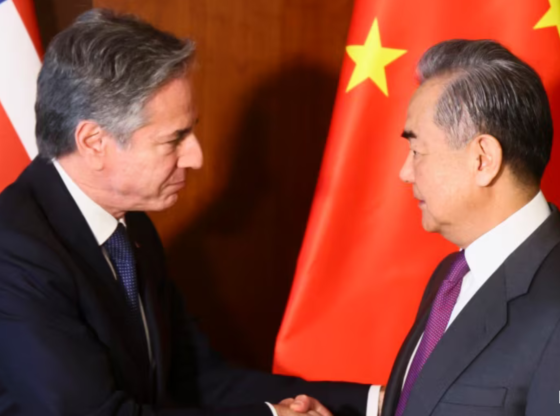STATE COUNCIL—
U.S. Secretary of State Antony Blinken said he will meet his Chinese counterpart, Wang Yi, in Laos next week, when the country hosts senior officials from the Association of Southeast Asian Nations (ASEAN).
Blinken added that he holds talks with Wang Yi “fairly regularly,” which is important for clarifying the two countries’ intentions and avoiding accidental conflicts.
“We’re able to communicate very clearly on points of disagreement. So at least China knows where we stand, just as we know where they stand. We do that on the South China Sea. We do that on Taiwan, and we do that on overcapacity,” Blinken told an audience at the Aspen Security Forum, a prominent U.S. national security and foreign policy conference, on Friday (July 19).
Although neither the United States nor China is a member of ASEAN, senior diplomats from the two countries are usually invited to relevant regional meetings and often hold face-to-face discussions on the sidelines.
The U.S. government on Friday advised American citizens in Taiwan to prepare for Taiwan’s annual air defense exercise, Wan’an 47, which will be held from next Monday to Thursday. The 30-minute exercise for civilians will test the emergency notification system to signal the start and end of the exercise.
Next week, Taiwan’s military will also hold its annual Han Kuang defense exercise, which typically includes large-scale live-fire drills.
The air defense exercises come as Chinese military aircraft and ships continue to operate around Taiwan. In recent months, Taiwanese reports have said Chinese military aircraft frequently cross the median line and enter Taiwan’s air defense identification zone.
“If a crisis occurred in Taiwan, it would be a crisis that would affect everyone in the world, not just our immediate neighbors. Fifty percent of commercial shipping passes through the Taiwan Strait every day; 70 percent of the semiconductors that the world relies on are made in Taiwan,” Blinken said Friday.
Blinken will hold talks with Wang Yi in the Laotian capital of Vientiane next week, following a major four-day policy conference of the Chinese Communist Party in Beijing.
The Third Plenary Session of the 18th Central Committee of the Communist Party of China approved policies aimed at improving the country’s technological strength and strengthening national security.
The personnel changes at this meeting attracted widespread attention. The Communist Party of China formally approved the application of former Foreign Minister Qin Gang to resign from his position as a member of the Central Committee and removed him from his position as a member of the Central Committee.
In addition, the plenary session also confirmed the expulsion of former Defense Minister Li Shangfu from the party. Li Yuchao and Sun Jinming of the People’s Liberation Army Rocket Force were also removed from the Central Committee.
ASEAN has announced its intention to speed up negotiations with China on a code of conduct to reduce the risk of conflict in the hotly disputed South China Sea, which it hopes to complete by 2026.
“We’re always watching, not just the Taiwan Strait, but the South China Sea,” Blinken told the Aspen Security Forum on Friday, noting rising tensions between China and the Philippines over a recent collision in waters near what China calls Second Thomas Shoal.
According to a legally binding ruling made by the International Court of Justice in July 2016, Second Thomas Shoal (called Ren’ai Reef in China) is located within the Philippines’ exclusive economic zone and China has no legal maritime claims to the waters around this low-tide island and reef.
Beijing has rejected the ruling, claiming “indisputable sovereignty” over most of the South China Sea.

